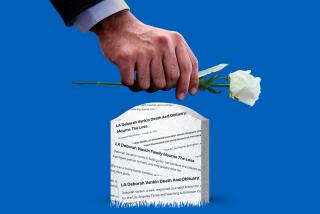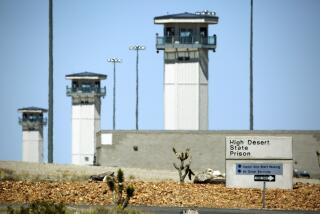Autopsy, a new era When a death raises questions
- Share via
When a relative discovered Sharon Waldorf’s 64-year-old mother dead in her Paramount home, Waldorf asked her mom’s physician about an autopsy. “The doctor didn’t want us to do it,” she recalls.
Waldorf’s mother had been in and out of the hospital that year with a series of strokes and seizures, and the doctor was confident that a stroke had killed her. Besides, the doctor said, an autopsy would cost several thousand dollars and insurance wouldn’t pay.
Waldorf and her two sisters insisted. “We wanted to know what it was that took our mom from us,” she says. “Mom would have wanted us to know.”
Autopsies were once standard procedure in U.S. hospitals. A few decades ago, doctors would recommend one even when the cause of death seemed certain, because it allowed them to gauge the effects of treatments and find out to what degree a disease had progressed, says Dr. Harry Bonnell, a fellow of the American Society for Clinical Pathology and a pathologist in private practice in San Diego.
But today, fewer than one in 10 deaths in the U.S. is followed by an autopsy, in part because of its high cost (which Medicare and most insurance companies won’t cover) and because many doctors believe -- erroneously -- that modern imaging techniques such as the MRI have rendered the autopsy obsolete.
Yet autopsies still provide one of the best ways for doctors to learn how to improve their practice of medicine. “Autopsies could reveal that, unbeknownst to practitioners, a certain disease presents differently than people think,” says Dr. Kaveh Shojania, a physician at the University of Ottawa who coauthored a Feb. 28 paper in the New England Journal of Medicine expressing concerns about the vanishing autopsy. For instance, a tear in the wall of the aorta -- known as an aortic dissection -- can easily be mistaken for a heart attack, as was the case for actor John Ritter. Though a jury found that his doctors were not to blame for Ritter’s death, the case drew new attention to the condition’s warning signs.
An autopsy, Shojania says, might also show that a medical device or procedure did not work as well as the doctors had thought, as occurred recently when autopsy studies helped reveal that drug-eluting stents, used to keep arteries open after blockages, were not performing as expected. They can offer clues about the spread of disease. In 2004, autopsies showed that four transplant patients at Baylor University Medical Center in Texas had caught rabies from the same infected organ donor.
In the case of Waldorf’s mother, the autopsy revealed that she hadn’t died of a stroke at all. A massive heart attack had claimed her life. “The main artery leading to her heart was 100% blocked,” Waldorf says. “It was probably genetic, which means it could happen to us.”
Waldorf and her sisters had known that their mother had high cholesterol and that it didn’t respond well to drugs. But proof that heart disease killed their mom has motivated the sisters to go the extra mile to control their cholesterol.
“Now we know we need to be extremely aggressive with our diet and exercise or we’re going to die at 64 like our mother,” Waldorf says.
--
Making the request
Today, the few autopsies that take place usually occur because the coroner has required them. Deaths that are unexplained, unnatural, or happen during surgery or shortly after admission to the hospital must be reported to the coroner or medical examiner, who then decides whether to require an autopsy. Autopsies are rarely ordered if the person is older than 60 and there’s no evidence of foul play, Bonnell says.
With few doctors pushing for autopsies, it’s up to the family to request them -- and Dr. Elizabeth Burton, a pathologist at the Institute for Health Care Research and Improvement at Baylor University Medical Center, says she’s seeing more and more families do just that. Hard statistics are difficult to come by, but pathologists who perform private autopsies say that demand is growing, partly because popular television shows such as “CSI” have raised awareness about the kind of information that an autopsy can provide.
Learning a parent’s true cause of death might teach survivors more about their own medical risks, as was the case for Waldorf and her sisters.
Even when the cause of death seems obvious, an autopsy can also reveal previously undetected underlying health problems that weren’t the primary cause of death -- conditions that family members too might inherit.
“Study after study has shown that about 20% to 30% of autopsies will come up with a significant medical condition that was not known during life,” says Dr. Michael Dobersen, coroner/medical examiner for Arapahoe County, Colo., and a member of the College of American Pathologists’ Autopsy Committee.
For instance, a 2002 report published by the Agency for Healthcare Research and Quality found that autopsies turn up errors that might have affected prognosis about 10% of the time. The same report said that autopsies found substantial inaccuracies in 8% to 23% of diagnoses listed as causing or contributing to death.
Someone who died of cancer might have had advanced heart disease too -- and that knowledge can help family members understand the risks that they may also face.
Autopsy information can be useful in cases where the person who died had experienced severe memory loss, says Debra Cherry, executive vice president of the Alzheimer’s Assn., California Southland chapter, in Los Angeles. Autopsy remains the only definitive way to determine whether the symptoms were because of Alzheimer’s disease or another form of dementia. “An autopsy can give you more clarity,” she says. “Many people just want to know. It gives them a sense of control to know that the person has a confirmed case of Alzheimer’s. Sometimes they learn it wasn’t Alzheimer’s but was vascular dementia related to small strokes.”
The distinction matters, because surviving family members can take steps, through diet and exercise, to reduce their own risk of strokes and stroke-related dementias, and scientists are also seeking tools to help prevent Alzheimer’s.
Sometimes, an autopsy can rule out a diagnosis that might have affected family members. Cherry recalls one family whose loved one was suffering from dementia with Lewy bodies, a condition that can cause delusions and hallucinations that can be extremely disturbing to bystanders. Some of the patient’s relatives could not shake the suspicion that schizophrenia might run in the family. An autopsy confirmed that the symptoms were because of the dementia with Lewy bodies, not schizophrenia.
--
The need for closure
Often, an autopsy offers solace to survivors. “The biggest reason families want them done is that they really want to make sense out of what happened,” Burton says. “It can really help with closure.”
Waldorf says she found comfort in her mother’s autopsy. “The pathologist said it probably happened very quickly,” she says. “It’s nice to know that she wasn’t suffering for a long time. We find peace in knowing that.”
Bette Frick of Boulder, Colo., whose mother died in 2001 after surgery for a broken hip, also found comfort in her mother’s autopsy. Frick’s mom had been diagnosed with cancer earlier that year, and the autopsy showed that the cancer had spread to nearly every organ of her body. “When we saw the results, it was easier to accept her death and somehow easier to think that sooner was better after all,” Frick says.
Guilt can sometimes be assuaged. “Parents who had kids that died need to know that it wasn’t their fault,” Burton says. “It happens with husbands and wives and other family members too. They think, ‘If I’d made sure he went to the doctor, I could have prevented this,’ but more often than not the autopsy shows it would have happened anyway.”
If doctors are reluctant to order autopsies, Shojania says, it’s often because they feel confident in their diagnoses or worry that an autopsy might find something that will open them to litigation. But studies show that autopsies help doctors far more often than they hurt. A 2002 study published in the Archives of Pathology and Laboratory Medicine found, for example, that autopsy findings rarely were at the crux of medical liability decisions. Even when a significant discrepancy existed between the autopsy diagnosis and the clinical diagnosis, and the unrecognized condition was deemed treatable, the defendant physicians were usually exonerated.
“It doesn’t seem to be the case that people are happy with their medical care and then they get an autopsy and then they want to sue,” Shojania says.
But with doctors hesitant to promote autopsies, it falls to the family to request them and often they must turn to private pathologists for the service.
Waldorf’s mother was never able to pick up the exercise habit, despite her doctor’s advice. But her mother’s untimely death, and the knowledge that it was because of heart disease, has made Sharon Waldorf diligent about her lifestyle. She does cardio exercises daily now, no longer eats fried foods and cut the cream from her coffee.
--
--
(BEGIN TEXT OF INFOBOX)
1-800-AUTOPSY
When Sharon Waldorf’s mother died, the Los Angeles County coroner suggested she call 1-800-AUTOPSY.
“I laughed, ‘Are you kidding?’ ” she says. “He said, ‘No, that’s the number.’ ”
Most pathologists who perform private autopsies eschew publicity and rely on coroner and funeral home referrals for business, but Los Angeles-based 1-800-AUTOPSY has taken a high-profile approach. Founder Vidal Herrera, an autopsy technician, is not shy about listing famous clients: “We took all of Johnnie Cochran’s cases and we worked on Coretta Scott King’s daughter,” he says.
Company vans feature the business name, 1-800-AUTOPSY, in bold letters, and Herrera sells T-shirts, skeleton key chains and gelatin brain molds on the 1-800-AUTOPSY website.
Though some autopsy providers disparage Herrera’s flamboyant methods, Waldorf considers herself a satisfied customer. She got a call back from the service within minutes and says she was treated with dignity.
-- Christie Aschwanden
More to Read
Sign up for Essential California
The most important California stories and recommendations in your inbox every morning.
You may occasionally receive promotional content from the Los Angeles Times.









